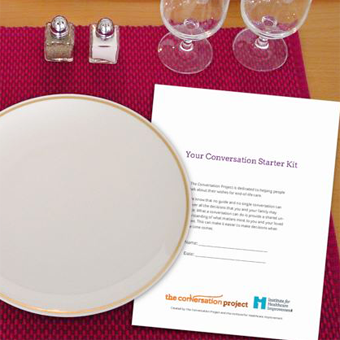There are a million reasons to avoid or put off having the Other Talk, but you and I already know the primary reason: Whether you’re doing the asking or the telling, it’s hard to talk about how we want the end of our lives to be.
Even though 90% of Americans say it’s important to talk about their end-of-life care wishes with loved ones, like most of us (70%, to be exact), I had not actually had the Other Talk with my loved ones until recently.
Let’s Have Dinner and Talk About Death
How in the world do you psych yourself up for the Conversation? “Good to see you! How’s everything going? Um, can we talk about… dying? Before there’s a crisis? While we’re still healthy?”
Tim Prosch’s motivation to pen AARP’s The Other Talk: A Guide to Talking with Your Adult Children About the Rest of Your Life came from his personal experience of caring for his parents during the last part of their lives. “Certainly the most challenging was the role reversal that I found myself in… becoming my parents’ parent… with no planning, no expertise, inadequate resources and, most significantly, no direction and no ‘buy-in’ from my parents. It brought me to the same conclusion as all those Boomers that I’ve interviewed over the last decade: I’ll never put my kids through what just happened to me!”
Just Pull the Plug
I thought I had it pretty well covered, actually. I have a living will, an Advance Directive and a Health Care Proxy. But according to Prosch, it’s not so much about filling out medical forms — it’s more about navigating how and when to give up the car keys, where you want (and where you’ll be able) to live, and how you want your loved ones to start taking over decision-making when you no longer can — including your preference for cure versus comfort and who will advocate for your medical needs.
“Elderly parents and adult children often enter into a conspiracy of silence. Parents don’t want to worry their children. Children…worry their parents will think they’re expecting or waiting for them to die.”
The problem with my “just pull the plug” mentality is that there is often no plug to pull, according to Pulitzer-Prize-winning syndicated columnist Ellen Goodman, co-founder of The Conversation Project. Goodman’s mother suffered from dementia and Goodman was left to make decisions on her behalf — without having had the benefit of her mother’s input or guidance.
A Good Death
She says, “In the last years of my mom’s life, I started talking with other people I knew who had been through similar experiences… The difference between a good death and a difficult death seemed to be whether the dying person had shared his or her wishes. So a group of my friends and colleagues—about a dozen of us in medicine, media, and the clergy—decided to come together and try to get people talking about this subject.
Elderly parents and adult children often enter into a conspiracy of silence. Parents don’t want to worry their children. Children…worry their parents will think they’re expecting or waiting for them to die. We often comfort ourselves with the notion that doctors are ‘in charge’ and will make the right decisions. And we all think it’s too soon to speak of death. Until it’s too late.”
The Conversation Project provides the tools, guidance and resources needed to get our thoughts together, find a comfortable setting, and have one of the most important conversations we’ll ever have. There’s even a guide for how to talk to your doctor. Everything you need to take a deep breath… and stick your toe in the water.
A Lot to Think About
One of the electives I chose in my doctoral program was Death and Dying. For fifteen years I co-facilitated the Hosparus Living Through Grief program. But I was not prepared for the emotional wallop I would encounter as I wrestled with questions like the following in the Conversation Starter Kit:
- Do I want to know how long I have to live or do I believe “Ignorance is bliss?”
- Do I want my doctors to do what they think is best or do I want a say in every decision?
- Are there any circumstances I consider to be worse than death? (Long-term need of a breathing machine or feeding tube, not being able to recognize loved ones, etc.)
- When would it be okay to shift from a focus on curative care to a focus on comfort care alone?
It’s a lot to think about.
Dying to Talk About It
And then there’s how to bring the subject up, whether you want to tell someone your wishes or ask someone about theirs. In an interview with O Magazine, Ellen Goodman suggested some ways to break the ice:
- “I was thinking about what happened to ______________, and it made me realize…”
- “Even though I’m okay right now, I’m worried that ____________, and I want to be prepared.”
- “I just answered some questions about how I want the end of my life to be. I want you to see my answers. And I’m wondering what your answers would be.”
Goodman emphasizes, “Whether you’re sharing your wishes or need to hear from your parents, start by brining up a memory, a statistic, an article. Try to remember these are not Grim Reaper talks. They’re not discussions about what’s the matter with you. They are about what matters to you. How you want the end of your life to reflect the whole of it.
As many people have told us, these conversations produce rich moments of emotional connection. They bring us closer together. What’s more, people who have had them tend to choose less aggressive care and leave their survivors less regretful and depressed. What a gift!”
It’s true. Starting the Conversation with my loved ones took some advance notice and preparation on my part and some receptivity on theirs. The right moment happened to be as we sat around the kitchen table, late one evening over Thanksgiving weekend. The emotional connection required and reinforced by talking about how I want the rest of my life to be brought the gift of a particular depth and glow to our here and now holiday.


















